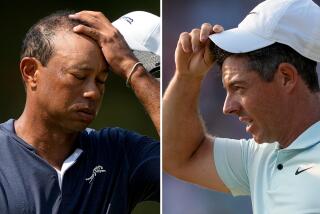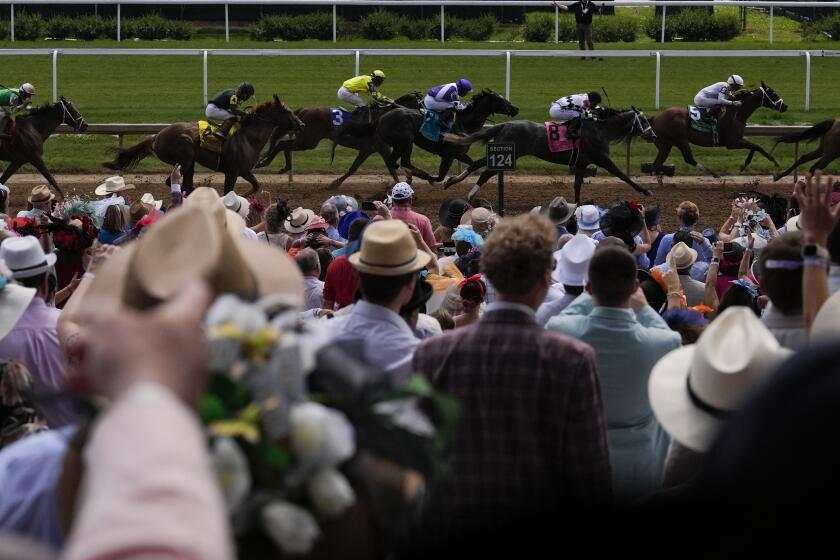It Was (More Than) 20 Years Ago Today ...
- Share via
LIVERPOOL, England — So deeply tucked in yore is Royal Liverpool Golf Club’s previous British Open that it transpired way back in 1967 when Liverpudlians glowed with peerless coolness and lived in the de facto capital of Planet Earth.
That means so long ago that a fellow could qualify as happening by merely hailing from Liverpool in 1967 and owning that brand-new album from Liverpool’s Beatles, “Sgt. Pepper’s Lonely Hearts Club Band.”
In fact, Royal Liverpool’s present-day club historian and a friend toted the phonograph record on vacation that summer, to Spain, where the people couldn’t yet buy it, hadn’t yet heard much of it and absolutely could not yet download it.
“We played it, and we were the heroes of this place we were,” said Joe Pinnington, who just finished a book on Royal Liverpool’s history. “We felt that pop music belonged to Liverpool.”
Then he returned home to Hoylake, just around the bend and 10 miles down the coast from the Beatles’ home, the same ground where the 135th British Open begins Thursday. There, 39 years ago, he watched grim, grown men in sullen grey suits cry on the links as an Argentine gentleman became the oldest modern Open champion at age 44 years 93 days.
That’s right: Royal Liverpool’s previous Open happened so long ago that galleries regarded Roberto De Vicenzo as an amiable champion with a towering British Open record -- 16 starts, 10 top-four finishes -- rather than the amiable champion who signed the world’s most famous incorrect scorecard.
The 1968 Masters hadn’t even happened.
“It is difficult to believe that almost 40 years have passed since an Open championship was last played at Hoylake,” said Jack Nicklaus, whose runner-up finish to De Vicenzo christened the American’s 12-major-tournament drought so familiar to golf scholars.
Either that, or it’s easy to believe that 39 years have passed since the summer of 1967, when De Vicenzo directed the 3-wood of a lifetime onto the green at No. 16 on July 16 and ...
And the BBC banned the Lennon-McCartney song “A Day in the Life” because its lyrics seemed to contain perhaps a hint of a hallucinatory tone ...
And the Beatles’ “year of psychedelia,” as the museum by the river Mersey in Liverpool calls 1967, shocked many ...
And Prince Charles enrolled at Cambridge, and Twiggy first visited America, and Pink Floyd released a debut album, and Paul met Linda, and “All You Need Is Love” emerged as a single July 7.
So much time and culture have passed that by now, the Beatles museum extols the John Lennon composition about the Liverpool Salvation Army home, “Strawberry Fields Forever,” then dryly notes on a placard that the song “could only have been born of a mind under the influence of outlawed chemicals.”
No Beatle adorned the British Open audiences, and Hoylake knew no psychedelia unless you count the thunderstorms on the eve of the third round. As they wound down their fourth round, Gary Player said to De Vicenzo, “Roberto, you’ve won,” and De Vicenzo remarked that he’d basically come just to be with friends and wound up winning the Claret Jug.
Even after not winning, defending champion Nicklaus spoke at the trophy presentation, and Pinnington, then 21, remembers thinking of the 27-year-old, “He has a little bit of aura to the man, doesn’t he?”
Then everybody went home, only about 29,800 of them, and Royal Liverpool became too small for the Open, which drew more than 200,000 spectators last year at St. Andrews.
The prospects for Royal Liverpool spiraled such that even the mention of having the Open again would draw skepticism from members.
Then, an adjacent school closed down, lending more space, and an adjacent municipal course offered space for parking and practice, lending still more space, and here comes a horde of world-famous golfers who have never even seen the second-oldest course in England.
So to rediscover the 1967 tournament, you need some historians.
“Only about 30 members saw Roberto’s shot on 16,” Pinnington said, “even though about 20,000 claim to have seen it.”
Nicklaus said: “Anyone who knew Roberto knew he was a very modest man, and that’s one of the reasons people liked him so much.”
Tony Jacklin struck the first televised hole-in-one. BBC2 presented the first color broadcasts that month, on certain programs.
And the son of a Buenos Aires house painter, the fifth of seven children, won the Open.
Jaime Diaz of Golf Digest quoted a passage De Vicenzo wrote for a magazine in Argentina, on the subject of golf: “It produces a mixture of pleasure, happiness, wisdom, self-esteem, as if one were caressed by clouds.”
At 83, De Vicenzo can’t make it back for a recollection of 1967 -- it’s a haul from Buenos Aires -- but there’s a lot of recollecting in the area, where the once-Beatlemanic Cavern club still stands.
Recollecting, Pinnington notes that before the Beatles made Liverpool light up on the globe, his father worked in one of Liverpool’s many cotton merchants, alongside Paul McCartney’s father.
For years, Pinnington said, McCartney’s father would tell Pinnington’s father about Paul. “He’s a clever lad,” the father would say, “but all he wants to do is play bloody music. It’s pathetic.”
More to Read
Go beyond the scoreboard
Get the latest on L.A.'s teams in the daily Sports Report newsletter.
You may occasionally receive promotional content from the Los Angeles Times.










